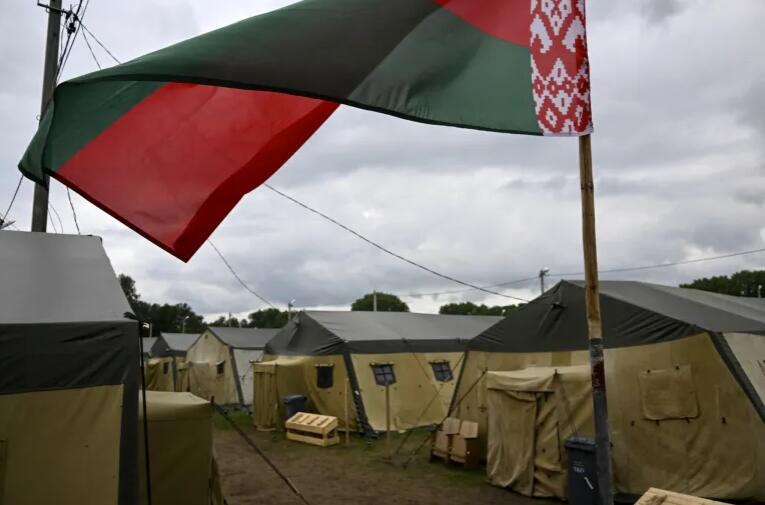NATO allies located along the alliance’s eastern front are growing increasingly worried about the presence of Russia-linked Wagner Group mercenaries in Belarus, where some have been deployed since a short-lived mutiny in Russia in June.
Poland, Lithuania and Latvia – members of NATO and the European Union which border Belarus – had already been on alert since large numbers of migrants and refugees began arriving at their borders from Belarus two years ago.
They have accused Belarus’s President Alexander Lukashenko, an ally of Russia, of opening the migration route in an act of “hybrid warfare” aimed at creating instability in the West.
Now concerns have grown further since the Wagner troops began arriving in Belarus after their short-lived mutiny in Russia.
Poland’s Prime Minister Mateusz Morawiecki said on the weekend that about 100 Wagner fighters in Belarus had approached the border with Poland, specifically a strategically sensitive area known as the Suwalki Gap.
“Now the situation becomes even more dangerous,” Morawiecki told reporters. “This is certainly a step towards a further hybrid attack on Polish territory.”
An incident on Tuesday added further to the concerns, with two Belarusian helicopters entering Polish air space at low altitude while carrying out exercises.
Poland’s defence ministry reported that incident to NATO, which said on Wednesday that it is monitoring the situation.
“NATO is closely tracking the situation along its eastern borders, including yesterday’s incident where two Belarusian military helicopters briefly crossed into Polish airspace at low altitude,” a NATO official said on customary condition of anonymity.
“We are in close contact with the Polish authorities on this matter, and we will continue to do what is necessary to ensure all alliance territory remains secure,” the official added.
Poland, Lithuania and Latvia say they have been deploying more troops and equipment to their borders.
Guntis Pujats, head of Latvia’s State Border Guard, told Latvian media on Wednesday that security risks in the immediate vicinity of the Belarus border have been high since Minsk started using migrants as a tool of “hybrid warfare”, and that the risks have grown with the arrival of the Wagner Group.
He said border guards have started training a special task force in response.
Lithuania’s President Gitanas Nauseda said this week that it would be tempting for the Wagner Group to use its presence near the Lithuanian border “for various provocations”.
“So I think the threat is serious,” Nauseda said during a visit on Monday to a site on the border with Belarus where seven Lithuanian officers were murdered by Soviet paratroopers 32 years ago.
Others have suggested that one should not overestimate the capabilities of the armed group.
Laurynas Kasciunas, chairman of the Seimas National Security and Defence Committee, told reporters that Wagner mercenaries in Belarus with their current combat power do not pose a conventional military threat.
Whether they pose a great threat in the future, he said, “will depend on further scenarios, how they are armed and their orders”.
In Poland, some critics of the government believe that it is overstating the threat in order to present itself as tough on security before parliamentary elections this fall.
Ukraine’s coastal region of Odesa was rattled by Russian drones which hit grain storage facilities in the south of the region, according to authorities in Kyiv.
The grain port of Izmail, an inland port across the Danube River from NATO-member Romania, was the main target of Moscow’s drone attack.
About 40,000 tonnes of grain destined for African nations, China and Israel were damaged, officials said,
“As a result of the attack, fires broke out at the facilities of the port and industrial infrastructure of the region, and an elevator was damaged,” Odesa region Governor Oleh Kiper said in a statement on the Telegram messaging app.
Ukrainian President Volodymyr Zelenskyy accused Russia of waging an attack on “global food security”.
“Unfortunately, there are damages,” Zelenskyy said on Telegram.
“The most significant ones are in the south of the country. Russian terrorists have once again attacked ports, grain, global food security,” he added.
Romanian President Klaus Iohannis called Russia’s repeated attacks on Ukraine’s Danube infrastructure near Romania “unacceptable” war crimes.
Russian drones targeted Ukraine’s Danube ports last month, destroying a grain warehouse, according to authorities in Kyiv.
Nine days of attacks
Kyiv has accused Moscow of stepping up attacks on Ukrainian grain infrastructure by hitting 26 port facilities, five civilian vessels and 180,000 tonnes of grain in nine days of attacks, since quitting the Black Sea grain deal.
Moscow has said it will treat ships in the Black Sea heading to Ukrainian seaports, “as potential military targets”.
Turkey and the UN brokered the wartime grain deal between Kyiv and Moscow last year, to ensure that Ukrainian ships could safely export agricultural products to the rest of the world from Black Sea ports. Moscow backed out of the agreement last month.
The Kremlin has said recent attacks are in retaliation for a Ukrainian attack on a bridge to Crimea, but officials in Kyiv aw them as Russia signalling its intention to reimpose a blockade in the Black Sea.
The United Nations has warned that Moscow’s termination of the Black Sea grain deal could trigger a potential food crisis in some of the poorest countries in the world.
In a call with Russia’s President Vladimir Putin on Wednesday, Turkey’s President Recep Tayyip Erdogan said he will continue in efforts to reinstate the deal which he described as “a bridge of peace” and urged Moscow to de-escalate the war.
The Kremlin said Putin reiterated Russia’s conditions for rejoining the grain deal, which included improving the terms for its food and fertiliser exports.

